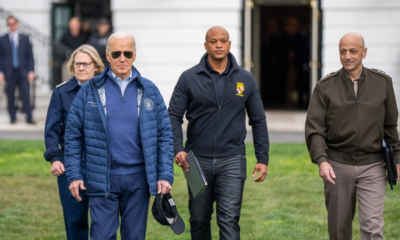Constitution
Judge dismisses Texas buoy case?
Has Judge David A. Ezra actually dismissed the Texas river buoy case? Or did Newsweek make the worst mistake a court reporter can make?
An astonishing development took place yesterday in the Texas buoy case – that is, if Newsweek got it right. According to correspondent Giulia Carbonaro, a visiting judge in Austin, Texas yesterday dismissed the government’s amended complaint in that case. If this story is correct, then Texas will be free to continue work on its riparian floating barrier in the Rio Grande. The federal government might appeal, but their burden would be significantly higher than ever before. But the story is likely incorrect – and Newsweek has made a most embarrassing journalistic mistake.
History of the case
To review: Judge David Alan Ezra, on loan from the District of Hawaii, is (or was) trying the case. U.S.. v. Abbott, 1:23-cv-00853, in the U.S. District Court for the Western District of Texas (Austin Division). (See the docket page, complaint, amended complaint, and preliminary injunction.) The government filed its complaint in July, and almost immediately moved for a preliminary injunction. This action concerns a floating barrier that Texas is placing along the Rio Grande. It consists of ballards, or buoys, strung on a cable running originally along the center of the river. (In August the State shifted the barrier toward the Texas side to stop it drifting into Mexican waters.) Metal disks with serrated edges alternate with the buoys, and nets underneath them prevent swimming.
Gov. Abbott acted after the first time that Border Patrol agents have cut concertina wire the State has placed on property lines running along the river. When the Department of Justice peremptorily ordered the State to remove the barrier, Abbott defiantly said, “So sue us.” The Feds sued them, alleging violation of the Rivers and Harbors Appropriation Act. In addition, Mexican authorities have complained about the barrier and demanded its complete removal.
Judge Ezra’s injunction tells Texas to stop all work on the barrier and move it toward the Texas riverbank. But Gov. Abbott appealed immediately to the Fifth Circuit Court of Appeals. That court affirmed Judge Ezra’s ruling and reinstated the injunction.
Other developments
Developments in the case, in rough order, are as follows. The Mexican Foreign Ministry lodged its complaint on August 2, after a dead body turned up floating among the buoys. Mexico’s government said they considered the buoys a violation of their sovereignty – and of the human rights of illegal migrants. On August 15, the first of two surveys by the federal government took place.
On September 7, shortly after Texas filed its appeal, the Fifth Circuit administratively stayed the preliminary injunction. Twelve days later, the federal government service notice of a second survey. At the end of September, the federals asked leave to file an amended complaint. The judge granted that leave, and the government filed the amended complaint on October 23.
While these things were happening, the Fifth Circuit received briefs from Texas and the federals – and several friend-of-the-court briefs. The Immigration Reform Law Institute took Texas’ side, saying Texas was within its rights to repel an invasion. Fourteen States (with Kansas in the lead) also took Texas’ side, saying Texas had the right to defend itself. Those briefs all reached the Fifth Circuit in September.
The federal government’s amended complaint mentions the Guadalupe-Hidalgo Treaty of 1848 ending the Mexican War; the original complaint does not. Thus Judge Ezra had before him a complaint alleging creation of a hazard to navigation, and a treaty violation. Specifically they alleged impeding navigation of the Rio Grande by Mexico without Mexican consent.
What else the judge had before him
On December 4, Texas filed a petition for an en banc rehearing. This is an inherently risky maneuver, because the Fifth Circuit has claimed full authority to sanction a party that files such a petition without sufficient grounds. But the panel that affirmed the injunction consisted of a Biden appointee, a Carter appointee (with “senior status”), and a Trump appointee. That last judge dissented sharply from the panel opinion and peppered his dissent with repeated references to judicial error. Thus one can well infer that he was urging Texas to file for an en banc rehearing.
The Fifth Circuit docketed the petition on Monday (December 4). The next day they directed the federal government to file a response.
But yesterday the State of Texas filed a Motion to Dismiss before Judge Ezra, alleging failure to state a claim.
The motion summarizes Texas’ position thus:
First, Plaintiff’s claim under the Rivers and Harbors Appropriation Act of 1899 fails for two reasons: (1) Section 12 of the Act authorizes actions only against “persons” and “corporations,” not against sovereign States or their officials; and (2) Plaintiff fails to adequately plead that the at-issue segment of the Rio Grande is “navigable” or that the buoy system is a prohibited “obstruction” or “structure[],” and therefore covered by Section 10 of the Act.
Second, Plaintiff’s claim under Article VII of the 1848 Treaty of Guadalupe Hidalgo similarly fails because: (1) text, case law, and history demonstrate that the Treaty, including Article VII, is not self-executing and thus cannot be enforced as domestic law; (2) the United States has identified no cause of action to enforce the Treaty; and (3) Article VII does not “preempt” Texas’s deployment of the buoy system.
At time of writing, neither docket page says anything about an order concerning the Motion to Dismiss. The docket pages includes a Proposed Order, not an actual Order. Furthermore, that a judge would grant such a motion on the very day of filing, without giving the other party a chance to respond, let alone be heard, strains credulity. But that is precisely what Newsweek’s Giulia Carbonaro reported this morning. One reader called the article “egregiously inaccurate” in a comment.
Abbott filed a motion to dismiss yesterday, and the court has taken no action on that motion.
Did the judge dismiss the case or not?
Nor can CNAV independently confirm any action by the judge. Indeed, neither Gov. Greg Abbott (R-Texas) nor Attorney General Ken Paxton said a word about the case in the last forty-eight hours. They haven’t even mention the Motion to Dismiss, much less any order granting it. The Attorney General did mention a new lawsuit Texas joined against the State Department.
Margaret A. Little and Margot J. Cleveland, two lawyers for The Daily Wire and The Federalist in this lawsuit, explained their reasons here. More to the point, why would Ken Paxton mention this lawsuit but not winning dismissal of the Texas buoy lawsuit?
So one of two things has happened in the last thirty-six hours. Either the State of Texas scored a significant victory for its right of self-defense – and then didn’t talk about it. Or, as seems far more likely, Newsweek’s reporter made one of the most egregious mistakes a reporter can make. CNAV cannot know what sources Newsweek might have inside the Texas Western District Court that the public does not have. But Newsweek cannot explain why Texas officials won’t even talk about it.
For those reasons, CNAV has submitted the article link to the Wayback Machine, and reached out to Newsweek and Giulia Carbonaro for comment. CNAV will, of course, continue to monitor this case.
Update
CNAV has updated the Wayback Machine links to Giulia Carbonaro’s article. An unaccountable server failure at the Internet Archive removed all record of any archiving having been done of this article or its outlinks. CNAV is investigating.
Terry A. Hurlbut has been a student of politics, philosophy, and science for more than 35 years. He is a graduate of Yale College and has served as a physician-level laboratory administrator in a 250-bed community hospital. He also is a serious student of the Bible, is conversant in its two primary original languages, and has followed the creation-science movement closely since 1993.
-

 Civilization2 days ago
Civilization2 days agoWhy Europe Shouldn’t Be Upset at Trump’s Venezuelan Actions
-

 Accountability5 days ago
Accountability5 days agoWaste of the Day: Principal Bought Lobster with School Funds
-

 Executive3 days ago
Executive3 days agoHow Relaxed COVID-Era Rules Fueled Minnesota’s Biggest Scam
-

 Constitution4 days ago
Constitution4 days agoTrump, Canada, and the Constitutional Problem Beneath the Bridge
-

 Christianity Today2 days ago
Christianity Today2 days agoSurprising Revival: Gen Z Men & Highly Educated Lead Return to Religion
-

 Civilization3 days ago
Civilization3 days agoThe End of Purple States and Competitive Districts
-

 Executive3 days ago
Executive3 days agoWaste of the Day: Can You Hear Me Now?
-

 Executive4 days ago
Executive4 days agoWaste of the Day: States Spent Welfare in “Crazy Ways”














